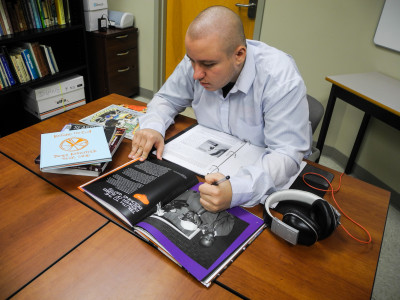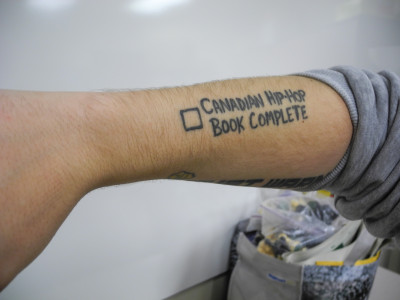Combining a Love of Hip-Hop and History from the Comfort of Home: Meet Alex Kuchma
Alex Kuchma, a third-year student at Cape Breton University is pursuing a Bachelor of Arts Honours in History with the goal of becoming a journalist. Alex is combining his studies with his love of hip-hop music and culture to make the most of his student experience. He is currently working on a large-scale oral history thesis project on the development of hip-hop in Canada.
Alex’s love of music developed during his childhood in Ontario, where his older sister opened his eyes to a variety of music genres. It wasn’t until the last decade that Alex honed in on his love of hip-hop in particular and began to research the music and culture more in-depth.
Alex moved to Glace Bay in 2011 and when it was time to head off to university, he knew CBU was the right choice. Studying at CBU gave Alex the opportunity to remain close to home while specializing in History.
The Process
“I’ve always been rather methodical and analytical with my interests,” says Alex, “I’d create lists, fill out checkboxes, explore every nook and cranny of a subject until I became an expert.” This natural inclination toward organization and attention to detail has helped Alex tremendously in the process of creating his thesis.
 The finished project will consist of 600-800 interviews spanning five-years, four-years of research and one year of writing. Alex knows his hard work will pay off, as he will end his project with not only a completed university thesis, but also a book of his own.
The finished project will consist of 600-800 interviews spanning five-years, four-years of research and one year of writing. Alex knows his hard work will pay off, as he will end his project with not only a completed university thesis, but also a book of his own.
Alex has completed roughly 300 interviews so far, including chats with artists such as Moka Only of the Swollen Members, San Diego hip-hop legend Orko the Sykotik Alien, solo artists Dan-e-o and Thrust and Vancouver’s The Rascalz, to name a few.
Alex focuses predominantly on Canadian hip-hop from the early 1980s to 2005. “What I’d like to do in terms of the book is to give a good understanding of how individual scenes throughout the country have contributed to the national scene as a whole,” Alex explains. “It will explore how they originated, evolved and got to where they are today.”
Hip-hop and the Community
One thing Alex says is critical to the examination of hip-hop is considering the connection to community. “Hip-hop is a community-based art form, so to look at hip-hop in any detail one must acknowledge the community that comes with it,” Alex explains “Knowledge enhances the art. So when we focus on the stories associated with the community, we’re able to gain a greater appreciation of the art itself.” But the community and culture of hip-hop goes far beyond the music. As Alex explains, the culture developed from the earlier days of hip-hop in the South Bronx, when it was used as a way to bridge the community together and keep youth away from gang life.
Taking it to the Next Level
 To show his dedication to the work, Alex tattooed “Canadian Hip-Hop Book Complete” on his forearm next to a little, empty check box. A lover of lists, Alex says the tattoo is primarily a joke, but will serve as a reminder to stay true to his end goal. Alex looks forward to adding a checkmark in the box as soon as the book is complete.
To show his dedication to the work, Alex tattooed “Canadian Hip-Hop Book Complete” on his forearm next to a little, empty check box. A lover of lists, Alex says the tattoo is primarily a joke, but will serve as a reminder to stay true to his end goal. Alex looks forward to adding a checkmark in the box as soon as the book is complete.
Advice From Alex
Though a project as big as Alex’s may seem daunting to some students, Alex wants them to know that they shouldn’t doubt themselves. “People do big projects,” he says simply. “No one is necessarily ‘prepared’ to do a project of this sort and everyone starts in the same position. I didn’t think I could write a book, but I’ve written three novels. I didn’t think I could change my diet and lose 100 pounds, but I did it. You just have to push through. Any job you’re faced with, any project you take on, it’s possible.”
Apply Now